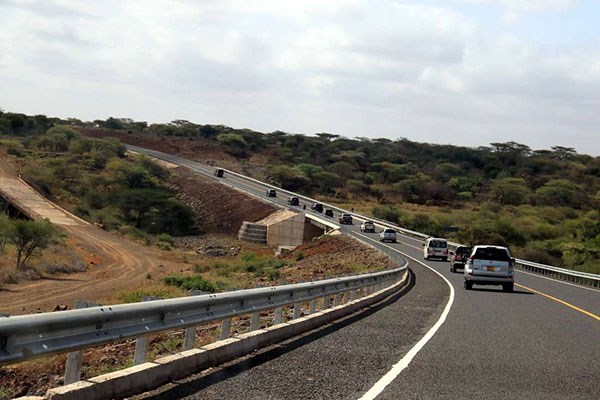
Wednesday May 15, 2019
By NICHOLAS KOMU

This image taken on January 29, 2019 shows the Isiolo-Moyale highway at Logologo in Marsabit County. Some traders use this road to bring in contraband. PHOTO | FILE | NATION MEDIA GROUP
Development projects are supposed to uplift people’s living standards and improve a region’s economy.
While that is what informed construction of the Trans-Africa highway connecting Kenya to Ethiopia, unscrupulous businesspeople have turned the project into a highway for illegal trade.
Since the completion of the highway in 2017, Kenya has become a destination of illegal goods and drugs with Moyale town being the illicit trade centre.
Last week, police in Kasarani, Nairobi, intercepted marijuana worth Sh8 million being ferried in a fuel tanker from Ethiopia.
The ambush not only exposed the magnitude of the trade, but also exposed security laxity along the northern corridor.
Ferrying illegal goods has become the norm after the smooth, high class road was opened two years ago.
TRADE
Experts project that trade between Kenya and Ethiopia will grow to Sh17.7 billion this year, up from Sh7bn last year, thanks to the 895-kilometre highway and the one-stop border post in the town.
This data bears testimony to the importance of the corridor to trade. In Moyale, a border control was set up to regulate what enters and leaves the country.
“You may not be able to trade on equal basis. Sometimes you have more coming in. That is an issue the country needs to look into to see what more we can take to Ethiopia,” Immigration Principal Secretary Gordon Kihalangwa said.
At the border, the customs department checks goods coming in and fees are paid. But with the porosity of the border, not all goods go through the customs office.
POPULAR GOODS
While some residents stock up food for household consumption, some rogue traders manipulate the free movement to bring in huge consignments of goods duty-free for sale to other parts of the country.
“In Ethiopia, food is very cheap and readily available. When food comes from down (Kenyan farmlands), traders sell it at higher prices because of transport and other costs,” Moyale resident Khalif Hassan says.